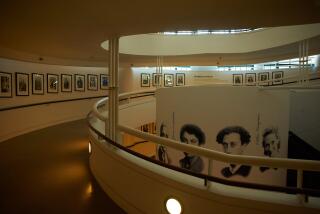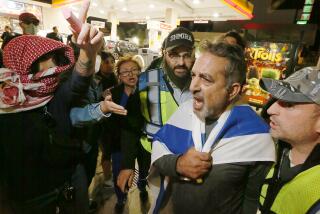Jordan’s King Hussein Visits Jewish Center : Tour: At Museum of Tolerance, Middle East monarch mourns those who have suffered atrocities over the centuries.
- Share via
Perched on a concrete slab in the Museum of Tolerance’s replica of a World War II gas chamber, Jordan’s King Hussein swallowed hard and blinked back tears as he watched a video about Nazi cruelty toward Jewish infants.
The emotional moment capped the king’s historic tour of the Simon Wiesenthal Center in Los Angeles on Friday--the first time a Muslim leader has visited an American Jewish museum.
Now at peace with Israel after decades of conflict, Hussein freely mourned the atrocities Jews have suffered over the centuries.
Accompanied by two rabbis, the soft-spoken monarch also studied the museum’s exhibits on other victims of racism. He stared fiercely at a film clip from the Los Angeles riots, shaking his head and pursing his lips at the sight of neighbors attacking one another.
And he watched in grim silence a documentary on the American civil rights movement that featured shots of bloodied activists and wailing relatives--scenes that could easily have been lifted from the present-day Middle East.
“Words cannot express my feelings,” Hussein wrote in the museum’s guest book before signing his name in both Arabic and English.
Later, he added: “This museum of peace and tolerance is a haunting reminder to all mankind of the many inexplicable acts of cruelty . . . of the tragedy and shame that result from blindness, illogical hatred and intolerance.”
Hussein’s remarks echoed many speeches he has made since making peace with Israel last year. For his efforts to end the Arab-Israeli conflict, the museum granted Hussein its first Peace Award.
Rabbi Marvin Hier, founder of the center, presented the king with a curving silver ram’s horn inscribed with: “He who pursues peace will find his prayers answered.” In Jewish tradition, a trumpeting ram’s horn, known as a shofar , calls worshipers to prayer and celebration. Prophets have foretold that a great shofar will one day herald an era of exquisite peace.
Hussein accepted the prize to a standing ovation.
While he acknowledged that violent foes across the Middle East seek to trip the stumbling peace process, the king vowed to press forward. And he promised to succeed.
“We look forward with confidence to a day when the words ‘Arab-Israeli’ no longer evoke images of strife,” Hussein said. Future generations--such as his three sons watching from the front row--will one day enjoy “a life free from fear, a life free from want, a life in peace,” the king added.
Like all visitors, Hussein started his tour of the museum by confronting two doors, one marked “Prejudiced” and one, “Unprejudiced.” As Rabbi Hier demonstrated, the entrance labeled “Unprejudiced” is always locked. “I’m sorry, Your Highness,” Hier said with an embarrassed smile, shuttling Hussein toward the “Prejudiced” door.
Nodding acceptance, Hussein strode through--and into the blinking, flashing, high-tech displays that 600,000 guests have examined since the museum opened more than two years ago.
The king listened, transfixed, to a video in which a black activist lamented the cruel convulsions of the civil rights movement with an anguished cry that still echoes across the Middle East today: “Too many, too many funerals.” In one of his few audible reactions, the king commented, “Good people, yes,” at a film clip honoring Los Angeles residents who tried to save beating victims during the riots in 1992.
“This is really something,” the king’s American-born wife, Queen Noor, said as they hustled through the museum. “We’ll have to come back.”
If they do return, museum director Gerald Margolis suggested they use disguises. That way, he noted, they could wander around without bodyguards muttering into watchbands, and without reporters snapping photos.
Hussein seemed delighted by the idea, Margolis said--and indeed, the king has proved adept at covert operations throughout his 42-year reign. He once posed as a taxi driver to get a sense of what Jordanian citizens really thought of his rule. And long before Israel and Jordan signed a peace treaty in October, Hussein was rumored to have gone undercover and slipped across the border for secret negotiations.
He was far from incognito on Friday, however.
Hussein and Noor received royal treatment from the moment their black limousine pulled up to the center on West Pico Boulevard and a Marine Corps band launched into a brassy salute.
Gov. Pete Wilson and his wife, Gayle, accompanied the couple. Sen. Dianne Feinstein (D-California) greeted them at the award ceremony. In brief remarks, she pledged to push Congress to fulfill a year-old promise to waive Jordan’s $750-million debt to the United States.
Later Friday night, Hussein accepted the Ronald Reagan Freedom Award at a ceremony in Simi Valley.
In a measured speech, he credited co-recipients--Israeli Prime Minister Yitzhak Rabin and Palestinian leader Yasser Arafat--for working together toward “this dream of peace” in the Middle East.
The king will address the World Affairs Council in Beverly Hills this afternoon.
More to Read
Sign up for Essential California
The most important California stories and recommendations in your inbox every morning.
You may occasionally receive promotional content from the Los Angeles Times.













